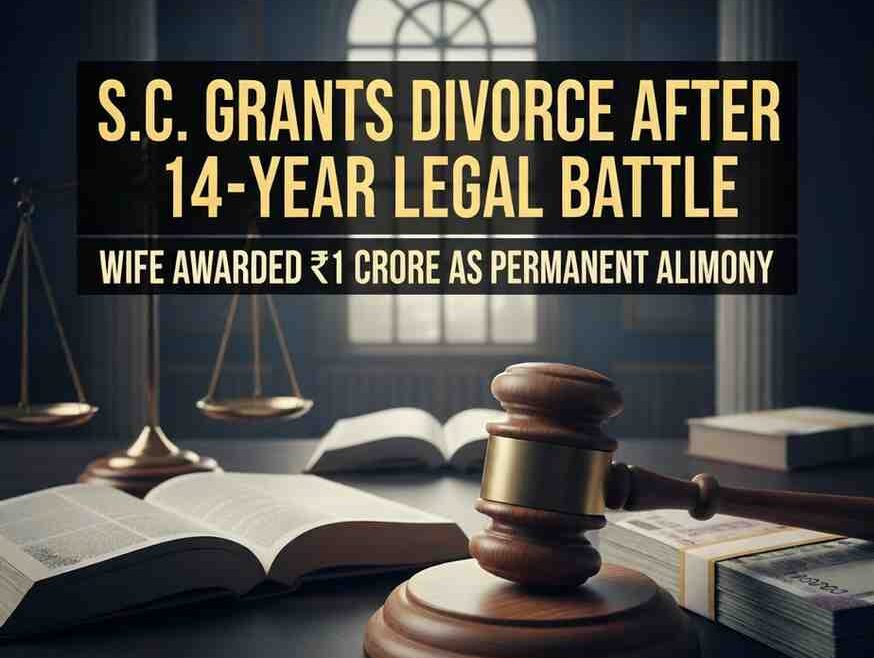S.C. Grants Divorce After 14-Year Legal Battle: After a 14-year legal battle, the Supreme Court of India granted a divorce to a couple who had been living apart for over 15 years, directing the husband to pay ₹1 crore in permanent alimony. The verdict also quashed all pending civil and criminal cases between them under Article 142 of the Constitution.
Introduction
In a landmark judgment on October 29, 2025, the Supreme Court of India brought to a close a 14-year legal battle between a husband and wife by granting them a divorce and ordering the husband to pay ₹1 crore in permanent alimony. The Court also dismissed all pending criminal and civil proceedings arising out of the marriage, citing the “irretrievable breakdown of marriage.”
Background of the Case
The couple got married on October 5, 2009, but their relationship soon soured. The wife alleged mental and physical harassment by her in-laws and left her matrimonial home on April 15, 2010. While residing with her parents, she gave birth to a son on December 28, 2010.
Seeking financial support, the wife applied Section 125 of the Code of Criminal Procedure (CrPC), 1973, on July 9, 2013, demanding maintenance for herself and their minor child. Later, in 2019, she also moved an application under Section 12 of the Protection of Women from Domestic Violence Act, 2005.
Trial Court and Appellate Court Orders
In January 2019, the Trial Court ordered the husband to pay:
- ₹10,000 per month as maintenance for the wife
- ₹5,000 per month for the child’s maintenance
- ₹5,000 for the child’s education
- ₹5,000 for rent, water, and electricity
- ₹4 lakh as compensation under Section 22 of the Domestic Violence Act
The wife was granted custody of the minor child, and both parties filed appeals. On July 29, 2021, the Appellate Court upheld the Trial Court’s decision and dismissed both appeals.
Family Court and High Court Proceedings
Subsequently, the Family Court in October 2022 ordered the husband to pay an additional ₹2,000 per month to the wife and ₹1,000 per month to their child under Section 125 CrPC. The husband and wife both challenged these orders before the High Court.
The High Court dismissed the wife’s petition but partly allowed the husband’s, setting aside the ₹4 lakh compensation and dismissing the wife’s maintenance claim under Section 125 CrPC. Dissatisfied, both parties approached the Supreme Court by filing Special Leave Petitions (SLP(Crl) No.6685/2024 and SLP(Crl) No.14187/2023).
Supreme Court’s Observation and Verdict
The Supreme Court noted that the couple had been living separately since April 2010, for over 15 years, and that multiple reconciliation attempts, including mediation, had failed. The Court observed that their relationship was “marred by years of acrimony and bitterness,” leaving no possibility of restoration.
Invoking Article 142 of the Constitution of India, the Court held:
“There is no purpose in perpetuating a legal relationship that has ceased to have any meaning. Therefore, we find this a fit case to grant a decree of divorce.”
Permanent Alimony and Settlement Terms
During the proceedings, the husband’s counsel expressed readiness to pay an additional ₹1 crore as permanent alimony to settle all pending claims. After considering the financial position of both parties, the Supreme Court found the amount to be fair, reasonable, and just.
The Court ordered that:
- The husband must pay ₹1 crore within three months as a full and final settlement for the wife and child.
- Upon receipt of the amount, no further claims shall be made by either party.
- However, the husband may voluntarily contribute to his child’s future education.
- All pending civil and criminal cases between the couple stand quashed and closed.
The Supreme Court concluded:
“The marriage stands dissolved upon proof of payment. The decree shall be drawn accordingly.”
Significance of the Judgment
This ruling underscores the Supreme Court’s power under Article 142, enabling it to deliver complete justice even in complex matrimonial disputes. It highlights the importance of the irretrievable breakdown of marriage as a ground for divorce and promotes amicable settlements to avoid prolonged litigation.
Key Takeaways
- Marriage dissolved under Article 142 of the Constitution.
- Wife awarded ₹1 crore permanent alimony as a full and final settlement.
- All pending cases were quashed, ensuring closure for both parties.
- The Supreme Court reaffirmed its commitment to justice over procedural technicalities.
FAQs: S.C. Grants Divorce After 14-Year Legal Battle
What is Article 142 of the Constitution of India?
Article 142 empowers the Supreme Court to pass any decree or order necessary to ensure complete justice in any case pending before it.
Why did the Supreme Court grant a divorce in this case?
The Court found that the couple had been living separately for over 15 years, with no chance of reconciliation, constituting an irretrievable breakdown of marriage.
Is the ₹1 crore payment mandatory for the divorce to take effect?
Yes. The decree of divorce is conditional upon the husband paying ₹1 crore to the wife within three months.
Can the wife or child seek further financial claims later?
No. The ₹1 crore amount is a full and final settlement, closing all future claims.

























